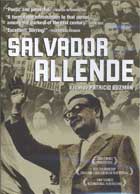
Salvador Allende 2004
Distributed by First Run/Icarus Films, 32 Court St., 21st Floor, Brooklyn, NY 11201; 800-876-1710
Produced by Jacques Bidou
Directed by Patricio Guzmán
DVD, color and b&w, 100 min.
College - Adult
Biography, History, Latin American Studies, South American Studies
Date Entered: 02/07/2008
Reviewed by Charlotte Diana Moslander, MS, MA, Assistant Director of Library Services, St. Francis College, Brooklyn, NYInterviews, voice-over narration, archival footage, and family photographs depict Salvador Allende and his career in the higher levels of the Chilean government in a way that is completely different from the way in which he was presented by the United States government and news media. He is shown to have been a great friend of the common people and a strong believer in socialism arrived at through democratic means. There was enthusiasm and prosperity right from the beginning of his presidency and coalition (Allende’s Chilean Socialist Party, Marxists, Christians, and Social Democrats) government. Allende is depicted as having been very unpopular among the owners of large tracts of land and capitalists because he nationalized many industries and confiscated and broke up the large landholdings (latifundios), distributing the land among individual small farmers and the national agricultural cooperative. Allende’s Chilean Socialist Party is declared to have been unaligned with Moscow, Beijing, or Havana; in fact, Allende is described as being a follower of the philosophy of the French Revolution. Nevertheless, the former U. S. Ambassador to Chile explains in an interview that Allende was seen as a threat by then-President Nixon because of fear that a Moscow-Havana Axis was being created.
The film is in Spanish and English, with English subtitles. Some of the subtitles show an definite slant: for example, “salieron al exilio” is translated as “forced into exile,” when it really means “went into exile,” and both “tarea,” which means “task” or “assignment,” and “mandato” which is best translated as “command” or “mandate,” are translated as “duty.”
This would be good supplemental material for college-level course in history, political science, or documentary filmmaking. A public library might show it as part of a series on history, or even U. S. foreign relations.
Awards
- Best Documentary 2004 Lima Latin American Film Festival